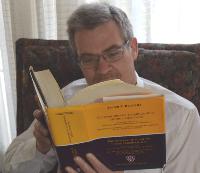| Vom Thema belegte Seiten: [1 2] > | How to express numbers in U.S. English Initiator des Themas: Reed James
|
|---|
Reed James
Chile
Local time: 21:32
Mitglied (2005)
Spanisch > Englisch
Hello.
I translate from Spanish into U.S. English. I know that in many Spanish-speaking countries (except for Mexico and Puerto Rico), the decimal separator is a comma, whereas in English it is a point. Furthermore, the Spanish language thousands separator is a point whereas it is a comma in U.S. English.
I normally switch the decimal with a comma and viceversa. That is no problem at all. However, there are some instances where the point seems to be part of the concept... See more Hello.
I translate from Spanish into U.S. English. I know that in many Spanish-speaking countries (except for Mexico and Puerto Rico), the decimal separator is a comma, whereas in English it is a point. Furthermore, the Spanish language thousands separator is a point whereas it is a comma in U.S. English.
I normally switch the decimal with a comma and viceversa. That is no problem at all. However, there are some instances where the point seems to be part of the concept itself. An example would be a law, such as in "Ley 2.384", or a National I.D. number such as "3.812.436".
My question is this: would it be right to substitute a comma for the decimal point in the cases described above?
Thanks.
Reed ▲ Collapse
| | | | Henry Hinds 
Vereinigte Staaten
Local time: 19:32
Englisch > Spanisch
+ ...
In stillem Gedenken
I'm not often faced with that problem because practically all I translate from Spanish comes from Mexico. However, wherever appropriate I would make the change between commas and points to reflect usage in the target language.
| | | | Reed James
Chile
Local time: 21:32
Mitglied (2005)
Spanisch > Englisch
THEMENSTARTER
Henry Hinds wrote:
I'm not often faced with that problem because practically all I translate from Spanish comes from Mexico. However, wherever appropriate I would make the change between commas and points to reflect usage in the target language.
Henry,
Thanks for your quick and helpful answer. I still can't help thinking that I am taking something away from the original number in the case of I.D. numbers. Isn't changing the number separators here a bit like changing "Juan" to "John"?
Reed
| | | | Patricia Rosas 
Vereinigte Staaten
Local time: 18:32
Spanisch > Englisch
+ ...
In stillem Gedenken
This is a good question, and I don't have a good answer but here's my two-cents worth-- but here's my two-cents worth--
In the US, even though we use commas when referring to amounts in the thousands, we don't usually use them in identifiers (try searching for "Law 2384 -- you won't find "Law 2,384" -- the comma is not used). You don't put commas in zip codes or PO Boxes (PO Box 1347 , not 1,347).
The same with the ID numbers--do we kn... See more This is a good question, and I don't have a good answer but here's my two-cents worth-- but here's my two-cents worth--
In the US, even though we use commas when referring to amounts in the thousands, we don't usually use them in identifiers (try searching for "Law 2384 -- you won't find "Law 2,384" -- the comma is not used). You don't put commas in zip codes or PO Boxes (PO Box 1347 , not 1,347).
The same with the ID numbers--do we know for sure that an ID like the one you cite is awarded sequentially and actually represents someone who was the 3,8xx,xxx person to get the ID card, or is it instead a random assignation of numbers? If it's the latter, I'd say that you might consider using dashes (just as we do with SS#s) or keeping it just as it stands in the original.
I'll be interested to see what others think...
I just looked in the Chicago Manual of Style, and it doesn't address your question, but it does give this example for decimals:
36 333,333 (European style)
36 333.333 (Canadian style)
36,333.333 (US and British style)
[Edited at 2006-10-03 00:39] ▲ Collapse
| | |
|
|
|
Reed James
Chile
Local time: 21:32
Mitglied (2005)
Spanisch > Englisch
THEMENSTARTER | Was an example of Chilean ID | Oct 3, 2006 |
Patricia Rosas wrote:
The same with the ID numbers--do we know for sure that an ID like the one you cite is awarded sequentially and actually represents someone who was the 3,8xx,xxx person to get the ID card, or is it instead a random assignation of numbers? If it's the latter, I'd say that you might consider using dashes (just as we do with SS#s) or keeping it just as it stands in the original.
Patricia,
I gave you an example of what a Chilean ID number would be. A "fake" ID if you will -- no pun intended. In Chile these numbers are sequential; you can even guess how old a person is judging by his or her ID number.
I suppose that I could provide rationale for writing these ID numbers in both the U.S. and original styles. I would tend to want to leave these numbers as is in case someone wanted to use them in a Google or private database search.
However, I am still undecided.
Reed
| | | | | Keep the punctuation | Oct 3, 2006 |
Unless they're actually cardinal or ordinal numbers, they're usually treated in computer applications as alphanumeric strings. That means, you copy the punctuation with them. Do you really want some bureaucrat to respond that they can find no record of anyone with ID number 3,827,516 (although they can find someone with ID number 3.827.516)?
I notice that in Spanish here, telephone numbers typically follow the American format for American numbers and in English here, they typicall... See more Unless they're actually cardinal or ordinal numbers, they're usually treated in computer applications as alphanumeric strings. That means, you copy the punctuation with them. Do you really want some bureaucrat to respond that they can find no record of anyone with ID number 3,827,516 (although they can find someone with ID number 3.827.516)?
I notice that in Spanish here, telephone numbers typically follow the American format for American numbers and in English here, they typically copy the source language format. Examples:
Si desea más información, llámeme al (703) 421-1716.
If you wish to call the Humanari sales center in Sao Paulo, their number is 5507-7996.
Again, alphanumeric strings. ▲ Collapse
| | | | Henry Hinds 
Vereinigte Staaten
Local time: 19:32
Englisch > Spanisch
+ ...
In stillem Gedenken
If you are really concerned about this detail, you could leave a translator's note explaining the situation. That would do it.
Also, translations of legal documents should be accompanied by the originals, and details like numbers may be compared.
| | | | RHELLER
Vereinigte Staaten
Local time: 19:32
Französisch > Englisch
+ ...
| for the U.S. only | Oct 3, 2006 |
I don't know how it works in South America.
We use commas in math
$1, 800.00 = one thousand-eight hundred dollars
300,550 = three hundred thousand- five hundred and fifty
but if the number refers to a library reference or section number, you should NOT change commas into periods or vice-versa.
| | |
|
|
|
| Anyone know why.....? | Oct 3, 2006 |
It's something I've been wondering about for a while: why do some, mainly European (I think), countries use commas and decimal points differently to the rest (UK, US.......)?
Andy
| | | | Jo Macdonald 
Spanien
Local time: 03:32
Italienisch > Englisch
+ ...
| Numerical names and numerical numbers | Oct 3, 2006 |
Hi James
Same thing here, in Italian 0,3 is 0.3 in English. This applies to numerical numbers used in currency (except for euro which uses the Latin system) measurements, sums, etc.
However I don’t think you should change the separator in things like ID numbers, the numbers of laws or other things which are more identification numbers (numerical names if you will) than numerical numbers.
Same with a computer IP number, ok it’s made up of numbers such as 123.45... See more Hi James
Same thing here, in Italian 0,3 is 0.3 in English. This applies to numerical numbers used in currency (except for euro which uses the Latin system) measurements, sums, etc.
However I don’t think you should change the separator in things like ID numbers, the numbers of laws or other things which are more identification numbers (numerical names if you will) than numerical numbers.
Same with a computer IP number, ok it’s made up of numbers such as 123.456.789 but it’s really the name of the computer online made up of groups of 3 numbers separated by a point. 123,456,789 isn’t the same name.
That’s my understanding of it anyway. ▲ Collapse
| | | | Inga Jakobi 
Deutschland
Local time: 03:32
Mitglied (2006)
Chinesisch > Deutsch
+ ...
| Think of IP numbers | Oct 3, 2006 |
My very first thought when I read this topic was the IP adress of my computer. I think Jo is absolutely right and you shouldn't change the points deviding Identity numbers because this would definitely change the number.
| | | | | European Style | Oct 3, 2006 |
I agree, only change numbers that state an amount or are used for some calculation. Leave the rest as is, since they are normally built complying to some standard.
Patricia Rosas wrote:
I just looked in the Chicago Manual of Style, and it doesn't address your question, but it does give this example for decimals:
36 333,333 (European style)
36 333.333 (Canadian style)
36,333.333 (US and British style)
[Edited at 2006-10-03 00:39]
Strange, I would have thought the European style has to be
36.333,333 since this is the way numbers are written at least in Germany and Austria. I think, if there is a space it has to be smaller than a normal space, so you can still see it is one number.
After all, it is not as easy as given here: European, Canadian and US/British. For example, in Switzerland you also find the decimal point instead of the decimal comma.
andyfrankland wrote
It's something I've been wondering about for a while: why do some, mainly European (I think), countries use commas and decimal points differently to the rest (UK, US.......)?
@Andy
If you are interested in the history of the decimal separator, you can start looking for information in this Wikipedia article:
http://en.wikipedia.org/wiki/Decimal_separator
By the way, you got it wrong: The rest of the world use decimal separators differently from us Europeans and not the other way round ....
[Bearbeitet am 2006-10-03 12:16]
| | |
|
|
|
RHELLER
Vereinigte Staaten
Local time: 19:32
Französisch > Englisch
+ ...
| reply to Andy | Oct 3, 2006 |
UK, U.S.
same historic reasons that explain why they are the only ones who still use pounds, inches, ounces in some cases
| | | | Reed James
Chile
Local time: 21:32
Mitglied (2005)
Spanisch > Englisch
THEMENSTARTER
Henry Hinds wrote:
If you are really concerned about this detail, you could leave a translator's note explaining the situation. That would do it.
Also, translations of legal documents should be accompanied by the originals, and details like numbers may be compared.
Henry,
I'm not overly concerned with this detail. However, I like to do things for a reason, and systematically so. I always work thinking that someone is going to read my every word; because that happens when I least expect it. I like the idea of writing a note.
Reed
| | | | Reed James
Chile
Local time: 21:32
Mitglied (2005)
Spanisch > Englisch
THEMENSTARTER | I am now convinced | Oct 4, 2006 |
Pirily wrote:
My very first thought when I read this topic was the IP adress of my computer. I think Jo is absolutely right and you shouldn't change the points deviding Identity numbers because this would definitely change the number.
Yes. and this made me think of outline numbers, which use several decimal points too. I have definitely decided that the decimal points are an integral part of these particular numbers. Thanks to all.
| | | | | Vom Thema belegte Seiten: [1 2] > | To report site rules violations or get help, contact a site moderator: You can also contact site staff by submitting a support request » How to express numbers in U.S. English | Wordfast Pro | Translation Memory Software for Any Platform
Exclusive discount for ProZ.com users!
Save over 13% when purchasing Wordfast Pro through ProZ.com. Wordfast is the world's #1 provider of platform-independent Translation Memory software. Consistently ranked the most user-friendly and highest value
Buy now! » |
| | CafeTran Espresso | You've never met a CAT tool this clever!
Translate faster & easier, using a sophisticated CAT tool built by a translator / developer.
Accept jobs from clients who use Trados, MemoQ, Wordfast & major CAT tools.
Download and start using CafeTran Espresso -- for free
Buy now! » |
|
| | | | X Sign in to your ProZ.com account... | | | | | |












